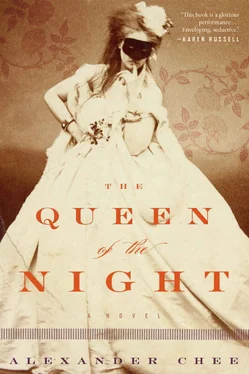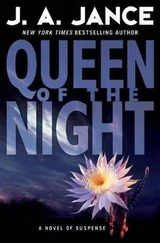And yet we were too soon. Cupid’s slow arrow was still too fast. All those years ago, I had told myself I would look for him only after the Empire had fallen or the Emperor or Empress died; that seemed safe. I did not have the luxury of taking risks. I did not ask him, but I felt sure he didn’t, either. I could have waited, I suppose, a little longer then, except I could not. And neither could he; he leaned in and kissed me once more, his hands still playing evenly, as if this were the most ordinary of gestures.
ON SEPTEMBER 2, 1870, after an earlier false report of French victories, the Emperor surrendered to the Prussians and was taken captive along with the Prince Imperial.
There was no negotiation for the Emperor’s return, but instead the Sénat noisily convened and declared the new republic without him. The Empress was chased from Paris.
There were wild celebrations in the street for the birth of the new republic. It was as if in defeat, Paris dressed in the air, briefly, of a liberated city — liberated from empire. Crowds descended on the Tuileries and it was looted before the new government’s troops took control and continued, at least, the posture of a continued war with Prussia.
All over the city, old newspapers immediately covered over the imperial N ’s and E ’s, soon to be replaced by immortelles, the symbol of the new republic.
I received the news from my dressmaker, who admitted he was in mourning. His eyes were red from grief.
I am ruined without her, he said. Without Compiègne alone, it would be a disaster, but now there will be no winter balls, either. Will these senators have balls? My congratulations on taking receipt of my last dresses, he said, and bowed ostentatiously.
When I then informed him I was there to order even more clothes, the dressmaker prolonged our visit, urging me to try the newest dress forms on. When I left him, he was all smiles again. As was I.
I had kept my impatience from showing — I nearly ran all the way back to the apartment.
All over Paris, I passed workmen busy chipping off the imperial seals. The imperial seals had been taken off me as well.
This was the day of my liberation, the end of my bargain with the Comtesse. I would leave him soon, I decided — within a day or two. I would have to leave the apartment as if I were going on one of my walks and take almost nothing with me except the jewels, which I would sell as I went to pay my way. The departure should be sudden so that he would have no way to stop me, as if he turned a corner and I went another way on to another life entirely.
But where to go? I thought to go to Pauline, back to Baden-Baden; the jewels meant I could afford to pay my own way this time. Or, if it was too dangerous to be in Baden-Baden — the tenor knew her, he could be there in an instant — perhaps Leipzig, then. Pauline had spoken fondly of it and had a good friend there, a composer. I could debut there instead of Weimar. I knew I could simply go to her unannounced. She would take me in.
Back at the apartment, I planned a dinner, thinking to have a last grand meal with the tenor. I would give him one last happy memory. I gave directions to Lucy for the shopping, named some of the dishes I knew he liked from our days in Baden-Baden, asking if she thought she could make carré d’agneau boulangère, poisson vert, even something as festive as punch à la russe.
She looked at me strangely. I had never suggested or planned anything of this kind to her. Lucy and Doro had adjusted after my return to my new schedule of rehearsal, the new clothes, the new bearing, but we’d also resumed many old habits, like our game of cards with gin, and this house still ran itself without my guidance, as if it were still the petite théâtre du désir it began as. I had never intruded on Lucy’s duties this way, never acted the part of maîtresse. I had never had the tenor to dinner, either, not this way. Sometimes, after a night spent here, he would make his way to the larder and return with a sausage, bread, and cheese.
No sooner had I wondered if this dinner was some unwelcome intrusion or if the menu was eccentric to her at best — the French could be quite strict about what was eaten when and how, none the more so than servants — when Lucy spoke.
Mademoiselle, I will do my best, but… and she gestured around us, with a laugh.
What is it? I asked.
Well, she said. Poisson vert, perhaps. But carré d’agneau? Most likely filet de chat.
When my expression showed I did not understand, she said, You may recall the Siege?
Of course, I said, chastened. Of course. But… didn’t the Emperor surrender?
She gave me a cutting look that surprised me. Yes, she said. He surrendered himself. With his prince, poor child. But we have not surrendered. We’ve lost the man who could never lead us to victory, but we have not lost. Now, it seems to me, we very well might win.
I tried to seem cheerful at this prospect or even to believe her. She noticed, and I could tell it offended her.
There is mail, she said. And with that, she pushed a letter from Pauline my way.
The letter had taken almost two months to reach me. Pauline had stayed until the third month of the Franco-Prussian War. She’d stayed later than most, remaining even when the fighting came close enough so that the smoke could be seen and the cries and cannon fire heard in the mountains near her house. She left when the Germans she’d loved so much, and who previously had loved her, began picketing her home.
These protesters were unmoved that their side was winning the war and cared not at all that Pauline had moved to Baden-Baden along with her husband in protest of the reign of Napoleon III — they did not know nor did they care that at the war’s start she’d even hoped it might result in the removal of Napoleon III, as that meant she could return home to Paris. She was almost on their side, except for their new belief she was an interloper. Eventually M. Viardot left first, for London, to secure accommodations for waiting out the war safely. Turgenev then took Pauline by train to the coast and put her on a boat with her children before following soon after; and with that, they were in exile. By the time she had returned home to Paris, Paris was her exile from Baden-Baden.
I know that when I see you again, whenever that is, it will be as if we each carry a piece of that vanished place with us against the day it might be reassembled or returned to glory. I hope you are still well and happy and safe, and that you continue with your lessons. Keep your piece of our lost home well. Do not let the voice rest; you have gained too much to let go.
I am, as ever,
Pauline
She was in London, then. I would have to get to London.
I’m delighted to see you take an interest in these things, the tenor said to me that evening as Lucy wheeled in the first course, a potato soup with leeks. I understand you have begun rehearsing here at home.
The rehearsals had been in part a test to see what Doro or Lucy said of my doings to him, and I quietly registered the success even as it disappointed me.
I am glad to hear of your rehearsing for your debut, he said. And how are we paying for our young accompanist?
I shrugged. I am helping him, I said. He is writing something new. An opera, if I understand correctly. With a role for me.
The tenor smiled. So he loves you, he said.
It is not love he feels, I said, joking. He did not laugh.
He set down his knife. A toast, he said. To your original role. An honor rare to the greatest of singers and rare certainly for a singer who has not yet debuted.
Читать дальше












